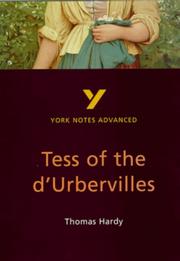| Listing 1 - 8 of 8 |
Sort by
|
Book
ISBN: 0719041422 Year: 1995 Publisher: Manchester New York Manchester University Press
Abstract | Keywords | Export | Availability | Bookmark
 Loading...
Loading...Choose an application
- Reference Manager
- EndNote
- RefWorks (Direct export to RefWorks)
Women in agriculture --- Great Britain --- History --- 19th century --- Women in agriculture - Great Britain - History - 19th century.

ISBN: 9780582823051 0582823056 Year: 2004 Publisher: London: Longman,
Abstract | Keywords | Export | Availability | Bookmark
 Loading...
Loading...Choose an application
- Reference Manager
- EndNote
- RefWorks (Direct export to RefWorks)

ISBN: 9780582329287 Year: 1998 Publisher: Harlow : London : Longman York Press,
Abstract | Keywords | Export | Availability | Bookmark
 Loading...
Loading...Choose an application
- Reference Manager
- EndNote
- RefWorks (Direct export to RefWorks)
Book
ISBN: 1137406879 1137406860 Year: 2017 Publisher: London : Palgrave Macmillan UK : Imprint: Palgrave Pivot,
Abstract | Keywords | Export | Availability | Bookmark
 Loading...
Loading...Choose an application
- Reference Manager
- EndNote
- RefWorks (Direct export to RefWorks)
This book looks at how hearing loss among adults was experienced, viewed and treated in Britain before the National Health Service. We explore the changing status of ‘hard of hearing’ people during the nineteenth century as categorized among diverse and changing categories of ‘deafness’. Then we explore the advisory literature for managing hearing loss, and techniques for communicating with hearing aids, lip-reading and correspondence networks. From surveying the commercial selling and daily use of hearing aids, we see how adverse developments in eugenics prompted otologists to focus primarily on the prevention of deafness. The final chapter shows how hearing loss among First World War combatants prompted hearing specialists to take a more supportive approach, while it fell to the National Institute for the Deaf, formed in 1924, to defend hard of hearing people against unscrupulous hearing aid vendors. This book is suitable for both academic audiences and the general reading public. All royalties from sale of this book will be given to Action on Hearing Loss and the National Deaf Children’s Society.
Great Britain --- History. --- England --- History --- Medicine. --- Great Britain-History. --- People with disabilities. --- History, Modern. --- History of Science. --- History of Medicine. --- History of Britain and Ireland. --- Disability Studies. --- Modern History. --- Modern history --- World history, Modern --- World history --- Cripples --- Disabled --- Disabled people --- Disabled persons --- Handicapped --- Handicapped people --- Individuals with disabilities --- People with physical disabilities --- Persons with disabilities --- Physically challenged people --- Physically disabled people --- Physically handicapped --- Persons --- Disabilities --- Sociology of disability --- Clinical sciences --- Medical profession --- Human biology --- Life sciences --- Medical sciences --- Pathology --- Physicians --- Annals --- Auxiliary sciences of history --- Health Workforce --- Medicine—History. --- Great Britain—History.
Book
ISBN: 0333740866 Year: 2000 Publisher: Basingstoke : Macmillan,
Abstract | Keywords | Export | Availability | Bookmark
 Loading...
Loading...Choose an application
- Reference Manager
- EndNote
- RefWorks (Direct export to RefWorks)
Digital
ISBN: 9781137406866 Year: 2017 Publisher: London Palgrave Macmillan UK :Imprint: Palgrave Pivot
Abstract | Keywords | Export | Availability | Bookmark
 Loading...
Loading...Choose an application
- Reference Manager
- EndNote
- RefWorks (Direct export to RefWorks)
This book looks at how hearing loss among adults was experienced, viewed and treated in Britain before the National Health Service. We explore the changing status of ‘hard of hearing’ people during the nineteenth century as categorized among diverse and changing categories of ‘deafness’. Then we explore the advisory literature for managing hearing loss, and techniques for communicating with hearing aids, lip-reading and correspondence networks. From surveying the commercial selling and daily use of hearing aids, we see how adverse developments in eugenics prompted otologists to focus primarily on the prevention of deafness. The final chapter shows how hearing loss among First World War combatants prompted hearing specialists to take a more supportive approach, while it fell to the National Institute for the Deaf, formed in 1924, to defend hard of hearing people against unscrupulous hearing aid vendors. This book is suitable for both academic audiences and the general reading public. All royalties from sale of this book will be given to Action on Hearing Loss and the National Deaf Children’s Society.
Social policy and particular groups --- Pure sciences. Natural sciences (general) --- History of human medicine --- Human medicine --- History --- History of the United Kingdom and Ireland --- History of Eastern Europe --- wetenschapsgeschiedenis --- personen met een beperking --- geneeskunde --- geschiedenis --- Europese geschiedenis --- kinderen met een beperking
Book
ISBN: 9781472441270 Year: 2017 Publisher: Londen Routledge
Abstract | Keywords | Export | Availability | Bookmark
 Loading...
Loading...Choose an application
- Reference Manager
- EndNote
- RefWorks (Direct export to RefWorks)
Book

ISBN: 2869064772 2869062095 Year: 2017 Publisher: Tours : Presses universitaires François-Rabelais,
Abstract | Keywords | Export | Availability | Bookmark
 Loading...
Loading...Choose an application
- Reference Manager
- EndNote
- RefWorks (Direct export to RefWorks)
L'ère victorienne demeure une époque fascinante pour les chercheurs, de par sa complexité, ses multiples facettes et les profondes mutations qui affectèrent les Britanniques pendant le long règne de Victoria. Pour beaucoup, ce fut une époque glorieuse pour la première nation industrielle du monde et son empire. L'Exposition internationale du milieu de siècle affirma cette suprématie tant économique, qu'industrielle, culturelle et militaire. Néanmoins, la société victorienne adhérait à un système de valeurs et d'idéologies centré sur le développement individuel, avec des aspirations parfois antagonistes. Il en résulte une image brouillée, difficilement décodable tant par les historiens que par l'ensemble des observateurs contemporains. En cherchant à explorer ces contradictions, ces paradoxes, le colloque organisé par le GRAAT en septembre 2002 a structuré sa réflexion autour de trois axes : tout d'abord les paradoxes liés au concept d'identité : comment les Victoriens se définissaient-ils, comment étaient-ils perçus par les autres peuples ? Ensuite les paradoxes associés aux notions de temps et d'espace, c'est-à-dire l'environnement des Victoriens : comment les Victoriens se réconcilièrent-ils avec un monde en profonde mutation ? Enfin, les paradoxes de la vie sociale et culturelle : comment les Victoriens mirent-ils en pratique leurs aspirations matérielles et intellectuelles, dans un cadre idéologique et politique profondément marqué par le poids des traditions et les conventions ?
History of Social Sciences --- Cultural studies --- ère victorienne --- développement individuel --- identité --- mutation --- tradition
| Listing 1 - 8 of 8 |
Sort by
|

 Search
Search Feedback
Feedback About UniCat
About UniCat  Help
Help News
News